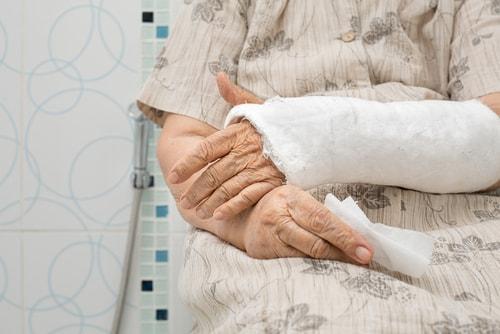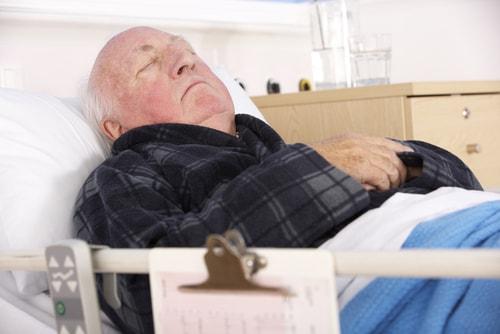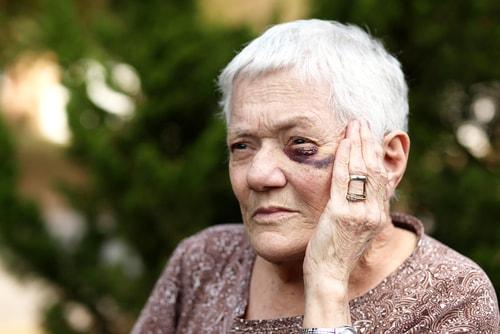Recent Blog Posts
What Responsibilities Do Nursing Homes Have to Patients During Hurricanes and Other Natural Disasters?
 As this post was being prepared for publication, Hurricane Dorian was making its way from the Florida coast up the eastern seaboard to the Carolinas. Current predictions expect the center of the storm to deflect away from land as it heads northeast, possibly bound for Nova Scotia by the weekend. While many people who live in the predicted path of the storm took or are taking action to keep themselves safe, those who reside in nursing homes are not able to do so. Instead, they must rely on the facility to continue providing care despite the fury of Mother Nature being displayed around them.
As this post was being prepared for publication, Hurricane Dorian was making its way from the Florida coast up the eastern seaboard to the Carolinas. Current predictions expect the center of the storm to deflect away from land as it heads northeast, possibly bound for Nova Scotia by the weekend. While many people who live in the predicted path of the storm took or are taking action to keep themselves safe, those who reside in nursing homes are not able to do so. Instead, they must rely on the facility to continue providing care despite the fury of Mother Nature being displayed around them.
The Dangers of Natural Disasters
Hurricanes are not a problem for the residents of Northern Illinois, but our region is still susceptible to other types of natural disasters. For example, in an average year, more than 60 tornadoes are reported in Illinois, some of which cause significant damage and injuries. Illinois is also known for extreme winter weather, including blizzards and ice storms that can lead to long-lasting power outages and other problems. Regardless of the event in question, nursing homes still have the responsibility to continue providing care to their residents and keeping the residents as safe as possible under the circumstances.
Why Are Nursing Home Patients at Risk for Sepsis?
 Did you know that nearly two million people develop sepsis in the United States each year? While the condition can be treated successfully, more than 250,000 deaths are attributed to sepsis annually. That is more than the number of deaths caused by AIDS, prostate cancer, and breast cancer combined!
Did you know that nearly two million people develop sepsis in the United States each year? While the condition can be treated successfully, more than 250,000 deaths are attributed to sepsis annually. That is more than the number of deaths caused by AIDS, prostate cancer, and breast cancer combined!
Unfortunately, nursing home patients are considered to be at increased risk for sepsis compared to the average person. To understand why this is true, you must first understand a little more about the condition.
Sepsis Is Not an Infection
The first thing you should know about sepsis is that it is not an infection, nor is it a bacterium, virus, parasite, or any other type of pathogen. Instead, it is a response to an infection. Put simply, a person can only develop sepsis if he or she has some type of infection.
When a disease-causing agent enters a person’s body, the body’s immune system goes to work in fighting it. A healthy immune system may be able to stop the agent from causing an infection while weakened immune systems might have significantly more trouble. If the infection does set in, however, the immune system does not give up. It moves on to fighting the infection directly.
Illinois Family Sues Nursing Home After Disturbing Video Surfaces
 When physical and mental conditions cause an individual to be unable to live on their own or care for themselves, they may require the round-the-clock care nursing homes offer. Placing a loved one in a nursing home, assisted living home, or other long-term care facility is one of the hardest decisions a family can make. If you have a loved one in a nursing home, you may wonder about your loved one’s quality of life, how their health issues are being addressed, and whether or not staff are treating your loved one with the respect he or she deserves.
When physical and mental conditions cause an individual to be unable to live on their own or care for themselves, they may require the round-the-clock care nursing homes offer. Placing a loved one in a nursing home, assisted living home, or other long-term care facility is one of the hardest decisions a family can make. If you have a loved one in a nursing home, you may wonder about your loved one’s quality of life, how their health issues are being addressed, and whether or not staff are treating your loved one with the respect he or she deserves.
While many nursing home workers are compassionate and competent, tragically, some nursing home staff are negligent or even abusive towards residents. In one recent Snapchat video, nursing home staff are seen openly mocking a resident and shoving a nightgown in her face. The family of the elderly resident is suing the facility at which the alleged abuse occurred for more than $1 million.
Fractures and Broken Bones in Nursing Homes
 If you have a loved one in a nursing home, you probably spend a lot of time worrying about him or her. You may worry about your loved ones medical conditions, the quality of care that they are receiving at the nursing home, how staff are treating your loved one, and the risk of injury. Nursing home residents almost always have physical issues which make them more likely to trip, fall, or otherwise injure themselves. Sometimes, a nursing home resident sustains a broken bone or fracture simply due to bad luck. However, frequent injuries, broken bones which are not promptly addressed by staff, or broken bones which do not heal properly can all be signs that your loved one may be experiencing nursing home abuse or neglect.
If you have a loved one in a nursing home, you probably spend a lot of time worrying about him or her. You may worry about your loved ones medical conditions, the quality of care that they are receiving at the nursing home, how staff are treating your loved one, and the risk of injury. Nursing home residents almost always have physical issues which make them more likely to trip, fall, or otherwise injure themselves. Sometimes, a nursing home resident sustains a broken bone or fracture simply due to bad luck. However, frequent injuries, broken bones which are not promptly addressed by staff, or broken bones which do not heal properly can all be signs that your loved one may be experiencing nursing home abuse or neglect.
Causes of Broken Bones in Nursing Homes
Many residents have medical issues which make them more likely to become injured. The most common cause of nursing home injuries, including fractures and broken bones, is falling. Nursing home residents over age 65 are four times more likely to die after falling as compared to elderly individuals who live who do not live in a nursing home. A fall can be caused by environmental hazards like poor lighting, walkway obstacles, slippery floors, and loose rugs. When unchecked hazards such as these cause a resident to fall and be injured, the nursing home facility may be held legally responsible for the injuries the resident sustained. A resident can also suffer a broken bone when staff make mistakes while transferring the resident in and out of bed or their wheelchair. Sadly, another cause of nursing home broken bones and fractures is intentional physical abuse.
Nursing Home Staffing Issues Can Lead to Poor Patient Care
 News stories involving nursing home abuse and neglect are tragically frequent occurrences in the United States. In many such stories, residents and their families are suing nursing homes which provide poor care, or even worse, subject innocent nursing home residents to abuse and purposeful mistreatment. At the heart of many nursing home abuse and neglect cases are problems with nursing home staff. Many nursing homes and other long-term care facilities are understaffed or employ staff who are not adequately trained. When staffing issues plague a nursing home, it is often the residents who end up suffering.
News stories involving nursing home abuse and neglect are tragically frequent occurrences in the United States. In many such stories, residents and their families are suing nursing homes which provide poor care, or even worse, subject innocent nursing home residents to abuse and purposeful mistreatment. At the heart of many nursing home abuse and neglect cases are problems with nursing home staff. Many nursing homes and other long-term care facilities are understaffed or employ staff who are not adequately trained. When staffing issues plague a nursing home, it is often the residents who end up suffering.
Understaffed Nursing Homes Put Residents at Increased Risk of Medical Complications
You may have previously heard about staffing issues at nursing homes, but few recognize how serious the problem really is. According to one report prepared by the Department of Health and Human Services, an incredible 90 percent of U.S. nursing homes are understaffed. Residents in facilities which do not have enough nurses, nurses’ aides, or other staff members are more likely to suffer from many preventable maladies including bedsores, infections, dehydration, malnutrition, weight loss, and pneumonia.
Bacterial Infections Can Escalate Quickly in Nursing Homes
 As with hospitals, doctor’s offices, and other healthcare facilities which treat a large number of patients per day, one of the biggest concerns for nursing home residents is the risk of infection. Many nursing home residents already have weakened immune systems due to other health issues, so a bacterial infection can quickly become an immediate medical emergency. Frequently occurring infections or infections which are not property treated can be a sign of nursing home neglect or abuse.
As with hospitals, doctor’s offices, and other healthcare facilities which treat a large number of patients per day, one of the biggest concerns for nursing home residents is the risk of infection. Many nursing home residents already have weakened immune systems due to other health issues, so a bacterial infection can quickly become an immediate medical emergency. Frequently occurring infections or infections which are not property treated can be a sign of nursing home neglect or abuse.
Frequent Infections Could Be a Sign Your Loved One is Not Receiving Proper Care
According to a study published in the Journal of the American Geriatric Society, the most frequent type of infection occurring in nursing homes is skin infection. Pressure ulcers or bedsores are a major issue for many nursing home residents. When an able-bodied person lays in a bed or sits in a chair, they are able to frequently shift their weight and avoid putting extensive pressure on certain body parts. However, a person with limited mobility cannot make such adjustments. Nursing home staff have an obligation to help residents avoid bedsores by frequently repositioning them. When bedsores are not treated, several life-threatening conditions can occur including cellulitis, septic arthritis, osteomyelitis, and even sepsis.
When is Chemical Restraint of a Nursing Home Resident Considered Abuse?
 Most people would agree that nursing home staff have a challenging job. While many nursing home residents are kind, cooperative, and simply want to live their lives as comfortably as possible, sometimes physical and mental health issues cause nursing home residents to act obstinately or aggressively. In some cases, a resident may require sedation through the use of chemical restraints. However, restraining a resident through the use of medication should always be a last resort and should only be used when the resident is a danger to himself, herself, or others.
Most people would agree that nursing home staff have a challenging job. While many nursing home residents are kind, cooperative, and simply want to live their lives as comfortably as possible, sometimes physical and mental health issues cause nursing home residents to act obstinately or aggressively. In some cases, a resident may require sedation through the use of chemical restraints. However, restraining a resident through the use of medication should always be a last resort and should only be used when the resident is a danger to himself, herself, or others.
Sedating Residents with Medication is Regulated By Law
Nursing home staff should never use psychiatric medication to sedate a resident unless the situation absolutely requires it. Sadly, studies show that many nursing home employees are over-administering sedating medication to residents simply for their own convenience. Even worse, some nursing home staff have been caught using restraints as a form of punishment. Not only is this practice immoral, it is also in direct violation of several laws including the Illinois Nursing Home Care Act.
The Problem of Physical Abuse in Nursing Homes
 If you have a loved one who is currently living in a nursing home, you expect that the facility will provide a high level of care based on your loved one’s needs. Many nursing home residents, as you probably know, are already dealing with a wide range of physical, mental, or behavioral conditions that necessitate the around-the-clock care that nursing homes provide. For some residents, however, things are made even more difficult. Sadly, physical abuse is not unheard of in nursing homes, and such abuse can be extremely serious.
If you have a loved one who is currently living in a nursing home, you expect that the facility will provide a high level of care based on your loved one’s needs. Many nursing home residents, as you probably know, are already dealing with a wide range of physical, mental, or behavioral conditions that necessitate the around-the-clock care that nursing homes provide. For some residents, however, things are made even more difficult. Sadly, physical abuse is not unheard of in nursing homes, and such abuse can be extremely serious.
Physical Abuse by Staff Members
It is no secret that staffing is a problem in many nursing homes. Chronic understaffing has long been associated with significant drops in employee morale, as well as concerns regarding proper training and patient care protocols. In short, far too many nursing homes are left with staff members who are overworked, underpaid, and, often, ill-equipped to handle their patients. Unfortunately, some staff members take their frustrations out on their patients.
Signs of Dehydration in Nursing Home Residents
 If you have placed a loved one in a rehabilitation facility, assisted living facility, or nursing home, you know how difficult this transition can be. You probably worried about how your loved one would adjust to living in a hospital-like environment or had concerns about the quality of care your loved one will receive. Unfortunately, these concerns are often justified. Nursing home neglect and abuse is an issue in long-term care facilities across the country. One major problem which nursing home neglect can lead to is dehydration.
If you have placed a loved one in a rehabilitation facility, assisted living facility, or nursing home, you know how difficult this transition can be. You probably worried about how your loved one would adjust to living in a hospital-like environment or had concerns about the quality of care your loved one will receive. Unfortunately, these concerns are often justified. Nursing home neglect and abuse is an issue in long-term care facilities across the country. One major problem which nursing home neglect can lead to is dehydration.
Nursing Home Patients at Increased Risk for Dehydration
When a person without physical and/or mental disabilities gets thirsty, they can simply walk over to the faucet and pour themselves a glass of water. However, the same is not true for most nursing home patients. Many nursing home residents suffer from physical conditions which make it hard for them to care for themselves. Residents who have dementia, Alzheimer’s disease, or other health concerns which affect cognition may not be able to recognize when they are not drinking enough fluids.
An Overview of the Nursing Home Care Act
 Sometimes, nursing home abuse and neglect goes unaddressed because residents and their families simply do not know what rights a nursing home resident has. Several federal and state laws were designed to prevent the mistreatment of nursing home residents and those staying in other long-term care facilities. The Nursing Home Care Act was created with the purpose of preventing elderly and disabled individuals from receiving substandard care in a nursing home.
Sometimes, nursing home abuse and neglect goes unaddressed because residents and their families simply do not know what rights a nursing home resident has. Several federal and state laws were designed to prevent the mistreatment of nursing home residents and those staying in other long-term care facilities. The Nursing Home Care Act was created with the purpose of preventing elderly and disabled individuals from receiving substandard care in a nursing home.
This statute reinforces the rights that every Illinois citizen enjoys and confirms that nursing home patients cannot be denied any of these rights. Additionally, the Nursing Home Care Act establishes further instructions as to how nursing homes in Illinois are to operate and how nursing home staff must treat residents. If your elderly or ill loved one currently lives in an skilled nursing facility or a nursing home, read on to learn about his important piece of legislation.

 312-535-4625
312-535-4625





